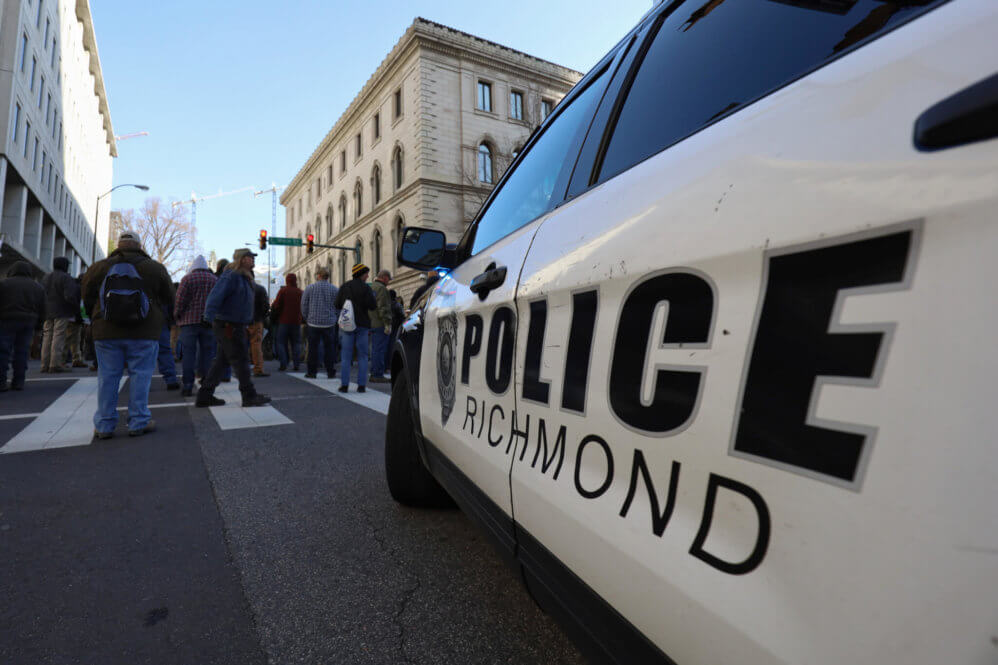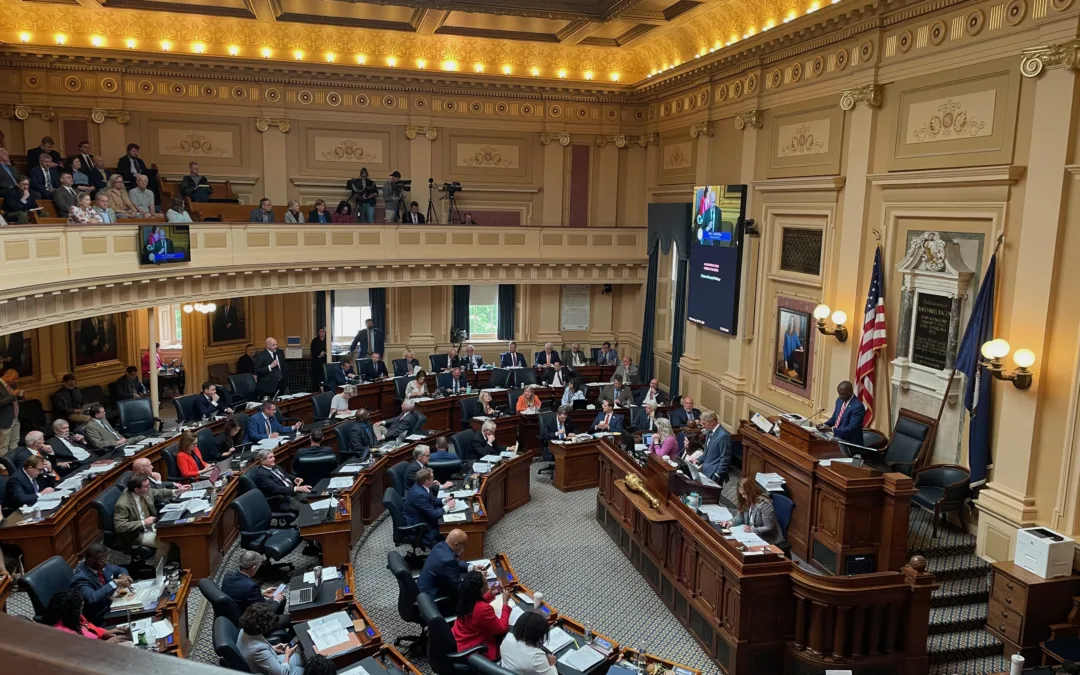
To see true police reform, Virginia needs to end qualified immunity, most candidates said.
RICHMOND-State Sen. Jennifer McClellan received a question this year that no parent should have to answer. Her son asked if he would be shot by police. Orlando Carter. Donovan Lynch. Xzavier Hill. Isaiah Brown. We know their names because police officers shot each young Black man this year. And then there’s the case of Lt. Caron Nazario. Video of his encounter with police went viral last month, drawing national attention. How would you solve this problem and reform police as governor? Moderators asked McClellan and the other four Democratic candidates to give their plan during Thursday’s debate.
If you look at most of the police reform bills passed in this year’s special session, they have one thing in common. Each was either sponsored or co-sponsored by McClellan. Go back to last fall’s special session and you’ll find the same thing. The proposal to increase the power of civilian review boards and give them both investigative and disciplinary powers? That would be SB 5035, co-sponsored by McClellan and Sen. Ghazala Hashmi. What about the Marcus Alert system? That was SB 5084, also McClellan’s bill. She also signed on to the bill banning chokeholds and one requiring officers to train in de-escalation techniques.
McClellan pointed that out Thursday, telling people what she had done in the Virginia Senate to address the problem. Moving forward, she wants to accomplish a few things. First, she wants to strengthen the Marcus Alert system. Second, she wants to end qualified immunity.
What Is Qualified Immunity?
Several candidates brought this up, so let’s step away for a minute and explain what exactly qualified immunity is.
Set up by a 1982 Supreme Court case, qualified immunity protects government officials, including law enforcement, from liability in certain cases. This includes situations involving excessive force or violating someone’s rights. But immunity isn’t automatic. Officers can still face criminal charges and you can file a lawsuit, but there are conditions.
In order to file, you first have to prove a court previously ruled that it was “clearly established” the officer’s specific actions were unconstitutional. A judge tosses the case otherwise. HB5013 would have removed that “clearly established” clause. That means a person could file a lawsuit and would then have to prove before a judge or jury that the officer’s actions were unconstitutional.
A bill to eliminate the practice passed the House but was shut down last fall in the Virginia Senate. The opposition claimed Virginia would lose all officers if they could be sued for a split second mistake.
Police Reform Or Start From Scratch?
Former Del. Jennifer Carroll Foy also supported eliminating qualified immunity. And while local governments currently decide if they need a citizen review board for their police, Carroll Foy said she would take that a step further. She told the debate audience that under her administration, review boards would be mandatory across Virginia and each one would have subpoena authority.
Lieutenant Gov. Justin Fairfax supported the citizen review boards, adding that the state needs bias training as well to see police reform happen. He also wants to see body cameras on every officer in every department.
Del. Lee Carter had a different take, arguing that the state government needs to address the problem where it begins.
“I think we’re asking police to do too much,” Carter said. “I don’t think it makes sense to have an armed policeman doing mental health checks or welfare checks or traffic enforcement.”
That means taking a look at all duties of law enforcement in Virginia and considering if we need to reassign some to other agencies.
“I think we need to go line by line on everything we’re asking police to do and ask ourselves, does it make sense to have an armed policeman do this job?” Carter said. “I think we need to start from scratch and reimagine what public safety looks like.”
The Problem in Virginia
When we talk about police shootings, it stems from a series of cases over the last five months all involving young Black men. First, there was Orlando Carter. Around 5 p.m. on New Year’s Eve, Richmond police followed the 27-year-old after he ran a stop sign. In the parking lot of Oliver Crossing Apartments, Carter exited his car. Soon after, Richmond Police Officer Ja-Ontay Wilson shot Carter three times in the back. Things got weird once that case went to court, as testimony didn’t match.
Then there was Xzavier Hill. Two Virginia State Police troopers shot and killed the 18-year-old on January 9, during a 4:30 a.m. traffic stop in Goochland County. Troopers clocked the teen going 96 in a 65 mph zone and took off in pursuit. Troopers then claimed he was reaching for a gun in the front seat when they shot him. This video details what the grand jury heard and questions remaining from the police report.
The third case involved a shooting death people still don’t understand. A Virginia Beach police officer shot and killed 25-year-old Donovan Lynch March 26, but nobody can say why. The officer never turned his body camera on. Also, the department only says that Lynch was “brandishing a gun” when he was shot, but Lynch’s family and some witnesses who came forward dispute that statement. Virginia Beach Police Chief Paul Neudigate even acknowledged, both in a March 27 press conference and while speaking to city council on March 30, that the department doesn’t even know all the facts in the case.
Isaiah Brown was shot as a Spotsylvania County deputy thought he had a gun. Instead, it was a cordless phone, pressed up to his head while he talked to the 911 operator he had called. This despite the fact Brown told the 911 operator minutes earlier he was walking down the road with a cordless phone and didn’t have a gun.
Finally, there’s the case of Lt. Nazario. What should have been a simple trip home in a newly purchased Chevy Tahoe turned into a situation where Windsor police pulled guns, pepper sprayed the officer, pulled him from his vehicle and threatened Nazario if he reported them.
A Call For Body Cameras
Former Virginia Gov. Terry McAuliffe’s son served as a captain in the U.S. Marine Corps and for a time, he was stationed in Hampton Roads, near Windsor.
“I can promise what Lt. Nazario went through, my son, who is white, [would not],” McAuliffe said. “We can’t tolerate it, we need full accountability. We need full transparency.”
McAuliffe’s plan would be to make sure every officer in each department across the Commonwealth has a body camera. Also, he wants to see them constantly on.
“If they’re on duty, those cameras [should] have to be turned on,” McAuliffe said.
This marked the third of four Democratic debates before the June 8 primary. The next debate is scheduled for June 1.
Brian Carlton is Dogwood’s managing editor. You can reach him at [email protected].
Politics

Youngkin, Democrats to start over on budget talks
The Republican governor stood with Democratic leaders in the General Assembly on Wednesday in a bid to ease tensions over their budget debate....

VIDEO: Domestic abuse victims speak out against the gun law bills Gov. Glenn Youngkin vetoed
Senate Bill 47 and House Bill 46 aim to close the loophole that allows offenders to transfer their firearms to someone else instead of relinquishing...
Local News

Virginia verses: Celebrating 5 poetic icons for National Poetry Month
There’s no shortage of great writers when it comes to our commonwealth. From the haunting verses of Edgar Allan Poe, who found solace in Richmond's...

Join the fun: Recapping Family Literacy Night’s storybook adventures
When’s the last time you read a book aloud with a loved one? If it’s difficult to answer that question, then maybe it’s time to dust off that TBR...




